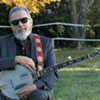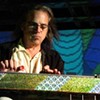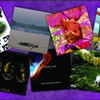Published May 11, 2005 at 8:26 p.m. | Updated August 4, 2020 at 8:17 p.m.
If you're talking banjo in the Green Mountains, the name Gordon Stone comes up fast. A born genre-hopper, he's comfortable with styles ranging from country to world music. Since the mid- '70s, Stone has plucked and strummed through countless groups, including 'grass greats Pine Island and Breakaway, new-wave sensations The Decentz, and Afro-fusion act Zzebra.
Going solo in the '80s, he continued to explore, fusing traditional bluegrass with bebop, reggae and Latin music. By the end of the decade, his banjo prowess had attracted the attention of a young Mike Gordon, who approached him for lessons. Gordon kept bugging Stone to check out his brand-new group, a little college act called Phish. Stone wasn't too impressed at first, but he eventually contributed both banjo and pedal steel to two of the band's most popular records.
Over four albums, Stone, now 55, has continued to push forward, challenging conceptions of the banjo's role in contemporary music. His latest disc, Rhymes With Orange, finds him weaving through funk rhythms and exotic progressions with uncommon ease. Featuring the talents of 15-year-old fiddle prodigy Mike Barnett and the slick bass bounce of Aram Bedrosian, the album is hardly old-fashioned. A CD release party is Friday at Nectar's.
Stone recently took time to chat with Seven Days about Burlington, his trio and the new disc.
SEVEN DAYS: You've been playing in the Burlington area for quite some time. What was your first gig here?
GORDON STONE: Well, I started playing ski areas, actually. In Burlington, the first place was probably Tut's, which was on North Street. That was a regular gig for Pine Island. We were the first band to ever play at Nectar's, as well. Some of the guys in the band knew Nectar from when he had that food stand out on Route 2.
SD: How do you feel about the scene right now?
GS: It went through a lot of changes, but I tend to think about more of what it's retained than what it's lost. I see a lot of similarities between then and now. There's still a lot of the same diversity. I moved away for a while and came back, but it seems like a lot of people do that. Coming back was really nice for me, for sure.
SD: You worked with Phish in the past and were Mike Gordon's banjo teacher. Was it weird to watch them become rock stars?
GS: I've talked about it with Mike, because I see him around and we hang out from time to time. I think he thought it was as strange as I did -- I don't think they had those expectations. It was just this phenomenon. And the music industry is crazy and fickle, and you just don't know what's gonna happen from year to year. But they absolutely helped to get my name around. I recorded on a couple of their discs and played live with them a few times. Around that same time, I was starting my own band with Jamie Masefield and Stacy Starkweather, and we definitely attracted a lot of Phishheads right off the bat.
SD: Bluegrass is perennial music, but its popularity tends to wax and wane. Why is it so hot right now?
GS: It comes and goes. I think it's just a pendulum; there's no real rhyme or reason to it. It swings back and becomes popular for a while, then goes away. When Pine Island started, it was really big -- there were three or four bluegrass bands in town that were working all the time. Then in the '80s, it was all but extinct. Nowadays, we get a mix of bluegrass fans and Phish fans at our shows, but I have an older following, too -- people that know me from the past.
SD: You're known for your banjo work, but you're a damn fine pedal steel player as well. Do you have a preference?
GS: Well, I'm using pedal steel more now than I ever had, at least in my band. It fits the new sound that we have; on the funkier stuff, it's really nice. Banjo has been with me longer, but I've still been playing pedal steel for a long time.
SD: The latest incarnation of your band features some new blood. What do they bring to the table?
GS: It's interesting. The slap bass and the funky fiddle -- they lay down the rhythm section, so it can be really driving without drums. It gives me something really solid to work over. And even though they're both young and energetic, they have a maturity that allows them to listen when they're improvising. They play off what I do really well; I can set up a rhythm or melodic line, and they just pick it right up and jam with it in a way that's more sophisticated than a lot of players.
SD: Your fiddler, Mike Barnett, is still in his teens. Are his parents cool with him playing late-night gigs in bars?
GS: Yeah, they've been really good about it. He gets out of school on Friday -- he lives in Longmeadow, Massachusetts -- and hops on the bus and comes up for the weekends. He'll be up for weeks at a time in the summer, when there's more work. He already has his own disc out, you know. His parents took him to Nashville and hooked him up with those serious studio cats to make his album, so they've been very enthusiastic about getting him going.
SD: You also play in Stone, Coane & Sacher, which is a more traditional bluegrass act. How do you balance the old-time stuff with your progressive side?
GS: Well, it's all cool, really. I love playing the traditional stuff, but I couldn't do it as a steady diet. There's just so much creatively going on with my band right now. Live, there's a lot more of the unexpected, and that's always fun. But I was always doing that. When I started in the early '70s, I was playing jazz, following the lead of guys like Bill Keith and Tony Trischka. Even before Bela Fleck came along, there were other players doing that kind of thing.
SD: Besides the lineup, what makes Rhymes With Orange different from your previous releases?
GS: First of all, there are only three players on it, and there are usually only those instruments playing, with minimal overdubs. It's different than the other discs in that respect, and it's funkier. It has more spontaneity to it -- we rehearsed, learned the tunes in a couple of days, and then recorded. I wanted to get it all down quickly to give it that fresh feel. It's only been a couple of months, and now we have a CD out.
And it is a little unusual to have just banjo, fiddle and bass. Actually, there is one other band that does that, and they're coming to the Jazz Festival -- The Trio, with Jean Luc Ponty, Stanley Clarke and Bela. I thought that was kind of interesting that Bela's instrumentation is the same as what I'm doing now.
SD: Maybe you've stumbled across a whole new sound -- the wave of the future.
GS: Yeah, maybe!
SD: Was your compositional approach different this time around?
GS: It kind of fell together, actually -- the tunes I was writing, and the way the guys were backing me up. I wouldn't say there is a common thread; the sound developed as we were practicing and recording. For example, Aram was figuring, "Well, I'm going to pretty much slap on everything." And that's fine, if it's what the song needs. They're my originals, but it's definitely a band thing.
More By This Author
Speaking of Music, musician Profile
-

Two Local Band Directors March in the Macy's Parade
Nov 22, 2023 -

Before a Burlington Show, the Wood Brothers Get Back to Basics
Oct 26, 2023 -

After a Half-Century of Leading Local Ensembles, Steven and Kathy Light Prepare a Musical Farewell
May 3, 2023 -

Double E 2023 Summer Concert Series Kicks Off With the Wailers
Mar 17, 2023 -

UVM’s New School of the Arts Gathers Many Creative Disciplines Under One Roof
Sep 14, 2022 - More »
Comments
Comments are closed.
From 2014-2020, Seven Days allowed readers to comment on all stories posted on our website. While we've appreciated the suggestions and insights, right now Seven Days is prioritizing our core mission — producing high-quality, responsible local journalism — over moderating online debates between readers.
To criticize, correct or praise our reporting, please send us a letter to the editor or send us a tip. We’ll check it out and report the results.
Online comments may return when we have better tech tools for managing them. Thanks for reading.














































